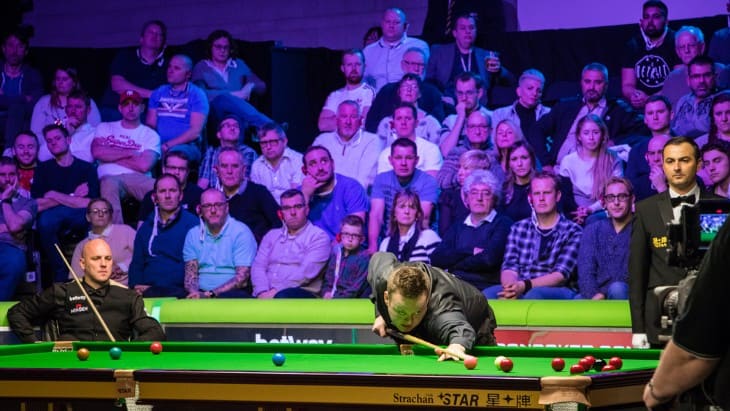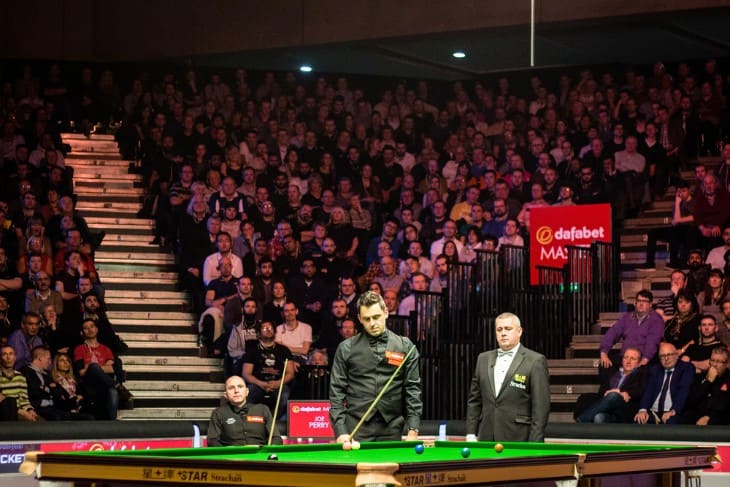- The Psychology of Performance: How Crowds Influence Players
- The Atmosphere of the Arena: Setting the Stage for High-Stakes Drama
- Fan Interaction and Player Psychology: A Complex Relationship
- Cultural Differences in Audience Behaviour and Their Impact
- The Evolution of Fan Participation in Snooker
- In Summary
In the silent, focused world of snooker, fans and crowds bring a unique energy. Their presence can transform high-pressure matches into intense dramas. This article explores how fans and crowds impact the players and the atmosphere of snooker matches.
From the hushed silence during a crucial shot to the roaring applause for a brilliant break, audiences play a key role in the sport's tension and excitement. We delve into the dynamic relationship between the players and their spectators, revealing the vital role of fans in the captivating world of professional snooker.
The Psychology of Performance: How Crowds Influence Players
Boosting Morale and Pressure: A Double-Edged Sword
The presence of fans and crowds in snooker can be both uplifting and challenging for players. This dual impact is a critical aspect of the game, especially during high-pressure matches.
On one hand, fans can greatly boost a player's morale. Cheering and encouragement from the audience can lift a player's spirits, especially when they are under pressure. This support often gives players a confidence boost, helping them perform better. Players feel energized and motivated when they hear the crowd rooting for them. It's a reminder that they're not alone, and their efforts are appreciated.
However, the same crowd can also add to the pressure. The expectations and intense focus of hundreds of eyes can be daunting. When a match is close and the stakes are high, even the most experienced players can feel the weight of the crowd's anticipation. This can lead to nervousness, especially during crucial shots. The silence of a waiting crowd, punctuated by occasional bursts of applause or sighs, creates an atmosphere thick with tension.
The impact of the crowd varies from player to player. Some thrive on the energy and become more focused, while others might find it distracting or stressful. Understanding and managing this pressure is a skill in itself. Players need to balance acknowledging the support with maintaining their concentration on the game.
In high-stakes matches, the role of the crowd becomes even more pronounced. Each reaction from the audience, whether it's a collective gasp at a missed shot or a cheer for a successful one, can influence a player's mental state. Players often have to mentally prepare not just for their opponent but also for the crowd's reactions.
The Home Advantage: The Impact of Local Support
In the world of snooker, playing on home turf can provide a significant advantage. When a player competes in their home country, the local support from fans and crowds can make a substantial difference in their performance.
Local support goes beyond just applause and cheers; it's a reflection of the deep connection between the player and their home audience. The familiarity of the surroundings, the comfort of playing in front of friends and family, and the backing of passionate local fans create a unique atmosphere that can boost a player's confidence and focus.
One of the most evident impacts of local support is the reduction of travel-related stress. Players competing in foreign countries often have to deal with jet lag, unfamiliar food, and different time zones. In contrast, playing at home means players can maintain their routines and avoid these additional stressors. They can sleep in their beds, eat their preferred meals, and follow their usual practice schedules.
The local crowd adds another layer of advantage. The roar of approval from fans who are cheering for their hometown hero can be an incredible morale booster. It creates a sense of belonging and motivates the player to perform at their best. Knowing that they have the backing of an entire arena or stadium can instil a sense of pride and responsibility.
However, the home advantage also comes with its own set of challenges. The expectations of the local crowd can be overwhelming. Fans who have high hopes for their homegrown talent may not tolerate mistakes easily. This can add pressure, especially when the player is facing a tough opponent. It becomes a balancing act for the player, who must draw strength from the support while managing the weight of expectations.
In professional snooker, tournaments are often held in various cities and countries, providing players with the opportunity to experience both the advantages and challenges of playing at home and away. They must adapt to different environments and learn to thrive under various conditions.

The Atmosphere of the Arena: Setting the Stage for High-Stakes Drama
Silence and Applause: The Unique Audience Dynamics in Snooker
Snooker tournaments are renowned for their unique audience dynamics. Unlike many other sports, snooker requires players to perform intricate manoeuvres with absolute precision, often in a hushed and concentrated environment. This distinctive setting has a profound impact on how audiences engage with the game.
One of the most distinctive features of snooker audiences is their ability to maintain near-perfect silence during a player's shot. While other sports may have noisy crowds, snooker demands a level of quiet that allows players to focus entirely on their game. The sound of a pin dropping might be louder than the audience during a crucial shot.
This silence isn't a sign of disinterest; rather, it's a display of respect for the players' concentration and skill. Snooker fans understand the importance of minimizing distractions, and they take pride in their ability to create an environment where players can perform at their best.
However, this silence is often punctuated by moments of intense applause and appreciation. Snooker fans are known for their discerning eye and ability to recognize exceptional shots and strategic brilliance. When a player executes a particularly challenging or skilful shot, the audience responds with enthusiastic applause. This applause is a testament to the fans' deep understanding of the game and their respect for the players' abilities.
Another unique aspect of snooker audiences is their restraint. Unlike some sports where spectators may engage in boisterous chants or taunts, snooker fans are remarkably composed. They appreciate the etiquette of the game and avoid disruptive behaviour that could affect the players.
The relationship between snooker players and their audiences is built on a foundation of mutual respect. Players understand that the silence and occasional applause are signs of the audience's genuine appreciation for their craft. In turn, fans recognize the immense skill and mental fortitude required to excel in snooker.
The Role of the Audience in Intensifying the Match
In snooker matches, the audience plays a big part in making the game more exciting. Their role is simple but powerful. When players are under pressure, the crowd's support can lift their spirits. Cheering and clapping give players a confidence boost. This helps them play better, especially in tough moments.
However, the crowd can also add pressure. The silence of fans during key shots can be intense. Players feel every eye on them, which can make them nervous. But this pressure can also push players to focus more and do their best.
The home crowd has a special effect. Players feel more at ease with local fans cheering for them. This support can improve their game. But it also brings high expectations. Players must handle this pressure well.
In snooker, the audience is usually very quiet during shots. This shows respect for the player's focus. When a player makes a great shot, the crowd's loud applause rewards their skill. This adds to the match's drama.
Each reaction from the crowd, like gasps or cheers, affects the players. It can change how they feel and play. Players need to stay calm and focused, even with the crowd's reactions.
Fan Interaction and Player Psychology: A Complex Relationship
Support and Distraction: Navigating the Thin Line
Support from the crowd can be a big boost for players. When fans cheer and clap, it can lift a player's spirits. This support often makes them feel confident and can improve their performance. Players feel energized and encouraged by the crowd's cheers. It reminds them that people believe in them.
However, too much interaction with the crowd can be a distraction. Players need to focus on their game. Paying too much attention to the crowd can break their concentration. This is especially true in high-pressure moments where focus is key.
The audience's behaviour also plays a role. Quiet and respectful fans help players concentrate. But loud or disruptive behaviour can break their focus. Players have to adapt to different crowd behaviours. Some find energy in a lively crowd, while others prefer quiet.
Every player handles this balance differently. Some thrive with active crowd support. Others need calm to focus. Understanding and managing this relationship with the crowd is part of the skill in snooker.
Players also need to prepare for different reactions. They must stay calm, even if the crowd reacts strongly to their shots. Keeping a clear head is essential, no matter what the audience does.
The Impact of Fan Behaviour on Player Concentration
In snooker, player concentration is key. The way fans behave can greatly influence this concentration. When fans are quiet during shots, it helps players focus. This silence shows respect for the player's need to concentrate. It creates an environment where players can think clearly and make better shots.
Loud cheers and claps can have different effects. For some players, this support boosts their confidence. They feel energized and perform better. The crowd's enthusiasm can be a big help, especially when the player is feeling pressure.
But, for other players, too much noise can be a distraction. It can break their focus and make it hard to concentrate. These players need quiet to stay calm and think about their next move.
Sometimes, even small sounds from the crowd can disturb a player. A sudden noise, like a phone ringing or someone talking, can distract them in crucial moments. This can affect their performance.
Players need to adapt to different crowd behaviours. Some learn to use the crowd's energy to their advantage. Others practice blocking out noise and staying focused, no matter what the fans do.
Cultural Differences in Audience Behaviour and Their Impact
Global Variations in Snooker Fan Culture
Snooker is played and watched globally, and fan culture varies from place to place. In some countries, fans are very quiet during matches. They understand the game's need for silence and respect it. This helps players focus and play their best.
In other countries, fans are more lively. They cheer loudly and show their excitement openly. This can create a more energetic atmosphere at matches. Some players enjoy this energy and find it boosts their performance.
The way fans react to shots also differs. In some places, fans clap for every good shot, no matter who plays it. In others, fans are more reserved. They only clap for exceptional shots or when their favourite player does well.
The level of knowledge among fans also varies. In some countries, fans know a lot about snooker. They understand the game's rules and strategies well. This makes their support more meaningful to players. In other places, fans might be newer to snooker. They are still learning and might not react to shots the same way.
Players need to adapt to these different fan cultures. They may play in a quiet hall one day and a noisy arena the next. Learning to adjust to these changes is a key skill for snooker players.
Adapting to Diverse Crowds: A Player's Perspective
Snooker players often face crowds that behave differently. Some crowds are quiet, while others are loud. Players need to adapt to these changes to play well.
Players who are used to quiet crowds might find loud ones challenging. The noise can be distracting. These players learn to focus more and block out the noise. They might use earplugs or practice mental exercises to stay calm.
Players who like loud crowds might struggle in quiet environments. They are used to drawing energy from the crowd's noise. When it's too quiet, they might feel less motivated. These players learn to motivate themselves. They might remember past successes or set personal goals to keep their energy up.
Adapting to different crowds also means handling different reactions. In some places, fans react strongly to every shot. In others, they only react to very good shots. Players learn to not let these reactions affect their confidence or game plan.
Some players talk to more experienced players or coaches about how to adapt. They learn tips and strategies for playing in front of different crowds. This helps them prepare better for matches in various places.

The Evolution of Fan Participation in Snooker
From Passive Observers to Active Participants
In the past, snooker fans were mostly quiet and just watched the game. They were like passive observers. They respected the silence needed for players to concentrate. Their role was to watch and appreciate the skills on display.
Now, fans are more involved in the game. They don't just watch; they participate. They cheer, clap, and react more to what happens during matches. This change has made snooker matches more lively and exciting.
This shift is partly because of how snooker is shown on TV and online. Fans see more of the players' personalities. They feel closer to them. This makes fans more eager to show their support during matches.
Fans also understand the game better now. Many know the rules and the skills needed to play well. This knowledge makes them appreciate good shots more. They react more because they understand the difficulty of the game.
Players have noticed this change. Many like the extra energy that active fans bring. It can make the game more fun and exciting. But some players find it challenging. They have to adjust to louder crowds and more reactions.
Technology and Social Media: Changing the Fan Experience
Technology has changed how fans watch and connect with snooker. In the past, fans could only watch matches on TV or in person. Now, they can watch live streams on their computers or phones. This means fans can see more matches, from anywhere in the world.
Social media has also had a big impact. Fans use platforms like Twitter, Facebook, and Instagram to follow players and share their thoughts on matches. They can post comments, share photos, and even talk directly to players. This has made the fan experience more interactive.
Players use social media too. They share updates, talk to fans, and show their personalities off the table. This helps fans feel closer to the players. It creates a stronger bond between them.
Online forums and snooker apps have also become popular. Fans use these to discuss matches, share tips, and learn more about the game. They can get information quickly and stay updated on tournaments and player rankings.
These changes have made the fan experience more engaging. Fans can be more involved in the sport, even if they are far from the snooker table. They can connect with other fans, learn more about the game, and support their favourite players in new ways.
In Summary
The role of fans and crowds in high-pressure snooker matches is both significant and dynamic. Their presence greatly impacts the psychological state of players and the atmosphere of the event. Fans provide much-needed moral support, boosting players' morale, especially under pressure.
However, this support can also intensify the pressure, as players feel the weight of expectations and the focused attention of the audience.
As snooker continues to attract a global audience, the interaction between players and fans will undoubtedly continue to evolve, further highlighting the indispensable role of fans in the thrilling and captivating world of professional snooker.
For more information:




.webp)


 (1).webp)




















